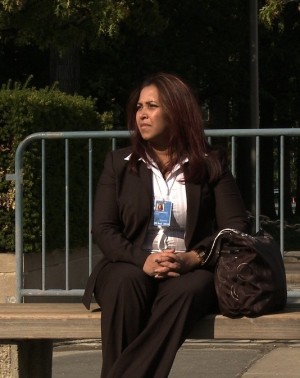Silent Voices Speak: The Real Sri Lanka Story
Sonali makes several attempts in the film to speak with Shavendra Silva, the deputy ambassador to the U.N. from Sri Lanka, to no avail. (As of June 29, 2012, on Sri Lanka’s Permanent Mission to the U.N. on the New York Web site, Ambassador Palitha Kohana has issued a statement regarding the U.N. Global Counter-Terrorism Strategy. Though he admits that “the menace continues in different forms and manifestations,” he goes on to say that “in 2009, with the defeat of terrorism, we brought to an end a dark era of daily bombings…the government has attempted a policy of restorative justice.”
It is clear that Sonali and Arnestad are not afraid to examine what that “policy of restorative justice” really means.
The Background Story
Sri Lanka is a tropical island lying off the southern tip of India, a paradise of natural beauty that has long attracted the unsuspecting and adventurous hordes of a more fortunate world. But not unlike the wiles of the fabled Eden, the serpent which lies underneath is a deadly adversary. A long and bitter civil war arising out of ethnic tensions between the majority Sinhalese and the minority Tamil communities in the northeast has turned the country into a wasteland of unbelievable proportions.
Dating back to the conquest in the 1790s and a centuries-long rule of Portuguese and Dutch traders, the British won out, leaving a sizable footprint on the landscape. They brought in Tamil laborers to work the coffee and tea plantations in the highlands of what was then called Ceylon. Of course, the Buddhist Sinhalese resented these Hindu upstarts and the die was cast.
Catapulting this tinderbox of hatred and separatism into the 20th century and a shaky independence in 1948, a bloody governmental conflict erupted against the Tamils by 1983 and their insistence on self-rule. The Tamil Tigers (the LTTE), founded in 1976, carried out regular suicide bombings in the capital, this being only one dreaded form of revenge. By the time the cease-fire was declared in May of 2009, after 25 years of fighting, more than 70,000 people were proclaimed dead during the final months of the conflict. While the Tamil Tigers used civilians as human shields, the government’s military forces indiscriminately shelled civilian areas, including hospitals. Protestors were treated as traitors and over 250,000 Tamil refugees were hustled into camps to waste away from the world’s eyes.
The Silencing of the Present
And now, three years later, after the supposed cease-fire, where does the country find itself?
In a question and answer session following the screening, the director Beate Arnestad and Sonali Samarasinghe, the widowed journalist featured in the film, were only too willing to share their impressions. Arnestad is no stranger to this conflict. She is a perfect example of someone who doesn’t choose her destiny but is chosen by it. When her diplomat husband was transferred to Sri Lanka in 2003, she witnessed soon enough what travesties were being committed. Her groundbreaking film, My Daughter the Terrorist, about two young women who become suicide bombers for the Tamil insurgents, brought international attention to the country.
“Three years after the cease-fire,” emphasized Arnestad, “the media is not free, no investigation is going on. The media doesn’t want to care. If they do, they’re in harm’s way.” Sonali has created a Web site for a dialogue between her people. “There’s a Diaspora — it’s like two countries that need to get back together.” Both women were eloquent and remarkably calm in their responses, considering the atrocities they have encountered. “My mission is to find justice for my husband,” Sonali explained, “Fear is pervasive. There’s a lot of self-censoring. They are so traumatized and they want to move on.”
For Arnestad, the number of victims is still numbing. “For three years we were not allowed in the war zone. Ninety-thousand women are widowed. There are over 25,000 orphans.” One audience member, challenging these reports, announced that her Sinhalese boyfriend said it was exaggeration — that “everything is fine in the country.” A moment of silence followed. Then Beate said in response, “Yes, 50 journalists have fled. All activists have fled. And everything is fine in the country,” (according to official sources, nearly 25 journalists have been killed since 1992, at least ten of whom were deliberately targeted by suspected government or Tamil Tiger forces).
As Sonali tells us, “I believe journalists can change the world. If not, why are we here? My husband is like the wind at my back.”
(The Human Rights Watch is one of the world’s leading independent organizations dedicated to defending and protecting human rights. Through the Human Rights Watch Film Festival, they bear witness to human rights violations and create a forum for courageous individuals on both sides of the lens. This year’s festival at the Film Society at Lincoln Center was organized around five themes: Health, Development and the Environment, Lesbian, Gay, Bisexual, and Transgender (LGBT) and Migrant’s Rights, Personal Testimony and Witnessing, Women’s Rights, and Reporting in Crises. Silenced Voices is an entry in the last category.)
Rating: 3 out of 4 stars


